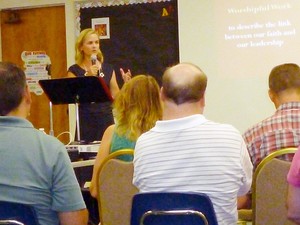As the Rev. Sara Singleton leaned in to speak about her mentors in the faith, Bill and Rachel Johnson, her face positively glowed.
Singleton met the Johnsons, both ruling elders at Whitworth Community Presbyterian Church on the campus of Whitworth University in Spokane, Wash., when her husband Jim was called there in 1991 as senior pastor.
“They were so invested in us, and they were characters of such integrity that we were wholly shaped by their lives,” Singleton said.
As Bill Johnson’s Parkinson’s disease worsened, he had a vision toward the end of his life—and provided the seed money—to develop the spiritual leadership of ruling elders.
“As elected leaders making discerning decisions, it was spotty as to whether those who were elected were equipped or prepared to serve,” said Singleton. “Before Bill died, he asked if Jim, I, and Jerry Sittser [an author and professor at Whitworth] would ‘do what we thought was right’ with the money. From Bill’s gift, we fashioned the Elder Leadership Institute (ELI).”
The Elder Leadership Institute (ELI) was developed as a church leadership training program—holistic in nature—in the Reformed tradition. ELI develops and supports spiritual leadership for the church by training ruling elders, members of a church’s leadership team—the Session, together with their pastor, a teaching elder. It accomplishes its goal through a two-phase program of teaching plus a retreat, practicums, spiritual disciplines and leadership opportunities.
“The name, ELI, is not only an acronym, but also a cautionary tale,” said Singleton, ELI’s founding director, referencing the biblical account of the high priest and judge of Israel who exhibited serious leadership failings and did not function effectively. “Eli also means ‘my God’ in Hebrew.”
Singleton and her colleague, the Rev. Lisa Johnson, associate director of ELI, presented the vision of ELI, the need for it, and how it works, to a group of teaching and ruling elders in one of the over 30 missional focus groups offered at the National Gathering of the Fellowship Community.
“Think about how you form your elders, or how you were formed—or informed—as an elder, because all of us are trained in some way,” Johnson began. “Your very presence here says that you care about training elders well.”
Johnson said that since conference attendees are often overwhelmed by too much information that is often hard to implement afterwards, she and Singleton wanted “to do the opposite.”
“If you discern that ELI could meet a need in your church, we want to come alongside you and help to implement the transformational change you are looking for,” she said.
ELI’s goal is transformation, not simply information. Participants experience how to live and function as elders according to the model set forth in the New Testament.
Johnson described the eternal tug of war and the several points of tension that occur in congregations in how elders actually function relative to their biblical and historical calling.
“We do business like the corporate board room, but we hunger for the upper room,” she said. “Our goal is to transform the way we do business because we are the upper room.”
Johnson said that the desire to have elders learn leadership skills and the desire for them to grow in spiritual maturity are often presented as an either-or choice.
“I think God envisioned it more holistically than that,” she said. “While growing spiritually, I can also learn leadership skills. Spirituality has touched worship, education and counseling. It is now ready to touch administration.”
Using 1 Peter 5:1-4 as a guiding scripture, ELI holds that elders are called to be 21st century shepherds to people, humble examples to the flock, leading God’s people where the ‘Chief Shepherd’ wants them to go.
“The church was early on about building strong lives, but somewhere we switched to building a strong institution,” said Johnson. “This caused the elders to shift from being shepherds to people to being superintendents of an institution. I don’t think that’s what God had in mind for his spiritual leaders.”
ELI’s goal is to return ruling elders from an institutional model back to a personal model, with the full assurance that the business of the church will still get done.
“The whole thing,” added Singleton, “is not business as usual.”

